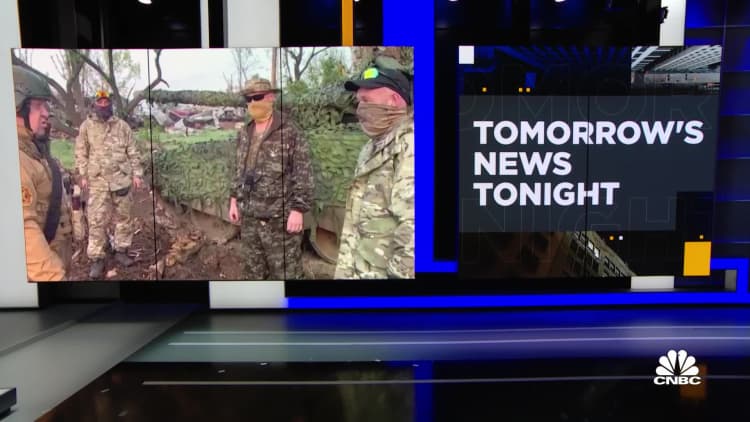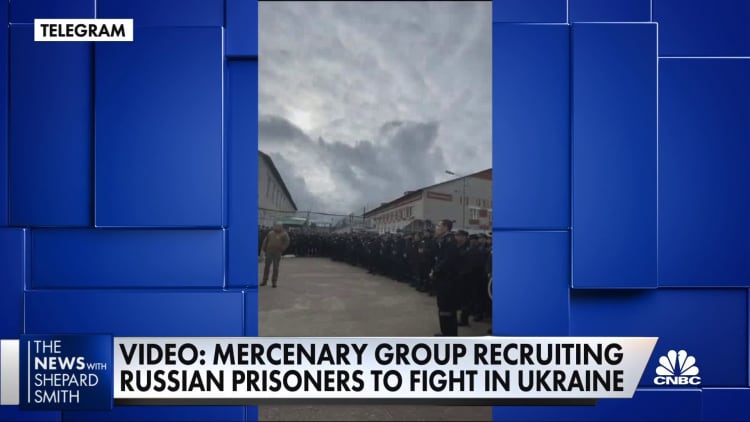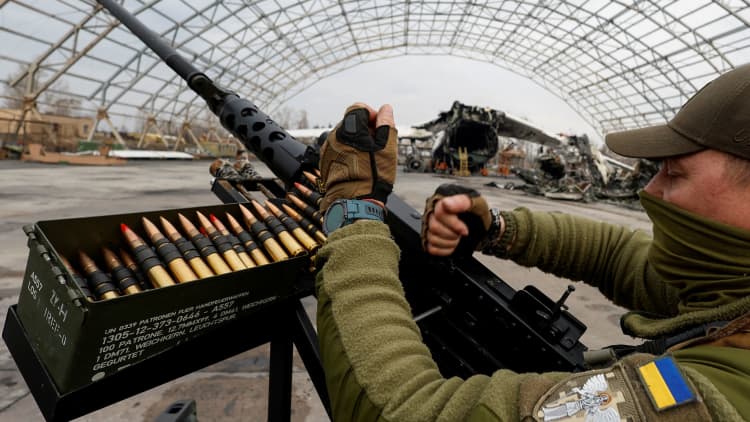
The PMC (Private Military Company) Wagner Center logo on the new building. PMC Wagner Center opened in St. Petersburg.
Maksim Konstantinov | Lightrocket | Getty Images
Long at odds with Russia’s military leaders in the war in Ukraine, Wagner Group head Yevgeny Prigozhin took his feud to a new level Friday when he leveled accusations that his fighters had been struck and vowing revenge.
The threat, made over his official Telegram channel, sparked what appeared to be a crisis in Russia.
The country’s security service FSB called on Prigozhin’s own Wagner Group private army to refuse orders and detain him, and it opened a criminal investigation for “organizing an armed rebellion, the prosecutor general’s office said.
Russian Lieutenant General Vladimir Alekseev on video from broadcaster RBK called it a stab in the back, calling it “a coup d’état.”
Russian President Vladimir Putin has been informed, and “necessary measures are being taken,” Kremlin spokesperson Dmitry Peskov said.
What is the Wagner Group?
Called by Russia a “private military company” the Wagner Group is called a proxy force by U.S. officials and others, while others label it a mercenary group.
It was founded in 2014, and is owned by Prigozhin, a 61-year-old who has been previously known as “Putin’s chef” for catering state events with his catering business.
In December, the U.S. believed that the Wagner Group had an estimated 50,000 personnel inside Ukraine — around 10,000 contractors and 40,000 convicts from Russian prisons, U.S. National Security Council spokesman John Kirby said.

Russia has denied the involvement of the Wagner Group in its official military operations, but the Washington think tank Center for Strategic and International Studies says it is often directly connected to the Russian state. It played a role in Russia’s operations in Ukraine in 2014 and 2015, it said.
“Instead of using the Russian narrative, according to which Wagner is a private military company, Wagner should be viewed as a classic proxy organization,” it said.
Worldwide efforts
The Wagner Group has also been involved in other parts of the world, including Africa.
The Wagner Group has operated in the civil conflict in Libya, and Russia sent it military equipment including fighter aircraft and armored vehicles, so that Russia could get a foothold in the country, the U.S. Department of Defense said in 2020.
Wagner Group was also sent to Central African Republic in its civil war, where the group was accused of executing civilians, attacking U.N. peacekeepers and targeting predominantly Muslim communities.
Senior Western diplomats have said that the Wagner Group took control of a gold mine there. Human Rights Watch said in a report that suspected Wagner Group forces have committed atrocities, including executing unarmed men.

The U.S. in January designated the Wagner Group a transnational criminal organization. In Africa, it destabilized countries committed “widespread human rights abuses and extorting natural resources from their people,” the U.S. Treasury Department said then in imposing sanctions.
The war in Ukraine has helped the Wagner Group grow in influence, Kirby, the U.S. National Security Council spokesman, has said.
“His influence is expanding. Wagner’s independence from the Russian Defense Ministry has, is only increased and elevated over the course of the 10 months of this war,” Kirby said at the December briefing.
The Russian military has been relying on Wagner fighters in Ukraine, and in some cases, Russia’s military officials have been subordinate to the commands of the Wagner Group, he said.
Prigozhin vows retaliation
Prigozhin has accused Russia’s military leadership of incompetence in Ukraine, but on Friday he publicly accused Russia’s military leadership of striking his forces. He claimed there was a missile attack at its rear camps.
Prigozhin said, without providing evidence, that Russia’s military leadership was responsible for the deaths of 2,000 fighters.
“Those who destroyed our lads, who destroyed the lives of many tens of thousands of Russian soldiers, will be punished. I ask that no one offer resistance,” Prigozhin said in a series of audio messages on his official Telegram channel.

Russia’s FSB security service responded by starting a criminal case against him for what it said was a call for an armed rebellion.
The FSB said that “his actions are a ‘stab in the back’ of Russian servicemen” and called on Wagner fighters to refuse orders and take Prigozhin into custody. Russia denies Prigozhin’s claims.
Security was increased in Moscow, Russian state news agency TASS reported, and video distributed by the Reuters news agency showed military vehicles near Russia’s Parliament early Saturday local time.
Prigozhin denied it was an armed rebellion, but called it “a march of justice.”
He claimed that his forces entered Russia, and that “Right now we are entering Rostov,” referring to a city in the south of Russia.
